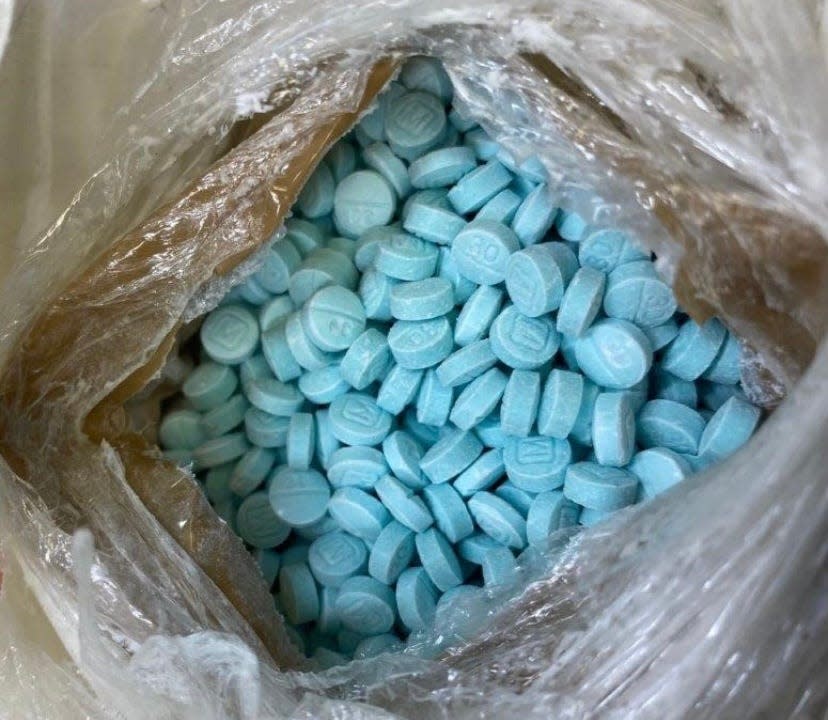Arizona might have legalized hard drugs – if it weren't for the scourge of fentanyl

- Oops!Something went wrong.Please try again later.
Were it not for fentanyl, which is killing roughly 1,500 Arizonans a year, we might be talking about the next horizon of drug legalization.
Hard drugs.
But that is discussion for later. Much later.
Fentanyl is reaping through the population, provoking most of Arizona’s nearly 8,000 life-threatening drug overdoses per year.
In the United States, opioid overdoses dominated by fentanyl are killing roughly 100,000 Americans annually.
At this rate, notes the classical scholar Victor Davis Hanson, more Americans will perish from opioids “than all the combat deaths in all the wars since America’s founding.”
30 million opioid doses were taken off the streets
In February, the U.S. Drug Enforcement Administration in Arizona, along with the Arizona attorney general and Tempe Police displayed large mounds of a drug haul they had confiscated in a three-year investigation.
Stacks of bags filled with powder-blue and white opioids mass produced by Mexico’s Sinaloa cartel with chemicals from China, would have threatened the lives Americans had they not been intercepted.
In all they represented some 30 million doses with a street value of $13 million.
As if to remind that violence is always just beneath the surface of the illicit drug trade, some 50 firearms were confiscated and on display.
In contrast to those large mounds of drugs, the DEA reminded Arizonans that fentanyl is so potent that just a few milligrams, “the small amount that fits on the tip of a pencil,” is enough to kill a person.
Every 10 years, Arizona legalizes something
Historically, Arizona has been moving in 10-year intervals in drug legalization. In 2010, after several tries, the state legalized medical marijuana.
It was well known at the time that “medical marijuana” was the camel’s nose to legalizing recreational canabis.
The largest cohort using medical marijuana in Arizona in 2018 was young adults aged 18 to 30 years, according to the Arizona Department of Health Services. They made up roughly a quarter of all medical marijuana users.
Presumably, they weren’t smoking it for their rheumatoid arthritis.
In 2020, Arizona legalized recreational marijuana.
At the present pace, you might have expected in 2030 the next step in legalization – street drugs. The hard stuff beyond marijuana.
But that’s not likely to happen.
Marijuana has unintended consequences
Opioids and, in particular, the fentanyl epidemic, have completely shaken the landscape on drug legalization.
Add to that the problems of highly potent legal marijuana and the medical and black-market problems they provoke, and the discussion about drugs and legalizations is beginning to change.
California is learning the lesson of unintended consequences, that legalizing marijuana created an enormous black market for pot that is far larger than what existed before it was legal.
Also, the high potency of new marijuana is causing significant health effects in young people. Emergency rooms in San Diego have since 2016 seen a steep rise in marijuana-related visits, largely young people.
Now they are beginning to see a similar spike in elderly patients.
At the same time, fentanyl is not abating.
To keep fentanyl out of jails:Detention officers may be scanned
Daniel R. Lasoff, an assistant clinical professor of emergency medicine at the University of California San Diego, wrote in the San Diego Union-Tribune, “In my 10-plus years practicing medicine, I have watched firsthand as the number of fentanyl-related emergency department visits and deaths have increased exponentially.
“… On a typical day, I will see between five and 10 non-fatal fentanyl overdoses, adding to the already incredible strain placed on our overstressed health care infrastructure.”
Don't expect Arizona to legalize fentanyl
In Oregon and now in British Columbia, we are beginning to see governments experiment with the next step in legalization – street drugs more potent than marijuana.
Oregon voters in 2020 decriminalized personal-use amounts of heroin, methamphetamine, LSD, oxycodone and other drugs.
The goal is to steer addicts away from jail cells and into treatment. Instead of a felony or misdemeanor, possession of controlled substances is now a new Class E “violation” that is punishable by a $100 fine that can be waived if a person seeks treatment.
Oregon is following a Portugal model that decriminalized hard street drug possession in 2001.
According to a 2018 paper, the number of individuals convicted and imprisoned for trafficking since 2001 in Portugal has fallen nearly 50%.
In January, the Canadian province of British Columbia began its own legalization program similar to Oregon and Portugal’s.
Those might have been projects Arizona watched closely, but not now.
Fentanyl and other opioids are sucking the oxygen out of our state. The legalization train is going off the tracks. And any discussion of legalizing hard drugs seems unthinkable.
Phil Boas is an editorial columnist for The Arizona Republic. Email him at phil.boas@arizonarepublic.com.
This article originally appeared on Arizona Republic: Fentanyl is the reason Arizona will never legalize hard drugs

